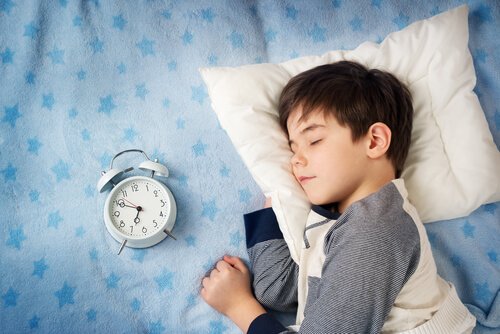How Much Sleep Does Your Child Need?


Written and verified by the psychologist María Alejandra Castro Arbeláez
If you’re asking yourself how much sleep your children need, the answer depends on their age and level of physical activity.
Healthy sleep habits should be formed as early as the first days of your baby’s life. Remember that newborns, children, and adolescents all need more sleep than adults.
When kids don’t get enough sleep it affects how they carry out their daily activities. Performance at school, family relations, and the expression of emotions can all be affected by a lack of sleep.
Below you’ll find a short guide on how much sleep your child needs depending on his or her age.
Healthy habits: find out how much sleep your child needs
From 1 to 4 weeks old: between 15 and 16 hours a day
Newborns sleep most of the day, in short blocks of two to four hours. During this stage, sleep patterns are still being established as the body begins to regulate itself.
The sleep routine isn’t yet connected to the concept of day and night. It’s also important to note that premature babies sleep more.
1 to 4 months old: between 14 and 15 hours a day
At around 6 weeks, behaviors begin to change. Adaptation to the outside world means sleep periods become longer and more regular. After the first month your infant might sleep between 4 and 6 hours straight at night without waking.

4 to 12 months old: from 12 to 14 hours a day
Although it can be normal for babies of this age to sleep up to 15 hours a day, most sleep only around 12 hours. This is the time to begin to encourage healthy routines at bedtime.
You’ll see a lot of changes in your baby’s social development during this phase too. Sleeping periods are more similar to those of an adult. At this time you’ll start to notice the importance of knowing how much sleep your child really needs.
1 to 3 years old: from 10 to 14 hours a day
After the first year and a half, kids start to take less naps during the day, possibly just one in the afternoon. This sleep may be around 1 to 3 hours, with between 8 and 10 at night. Babies in this stage of development usually sleep around 10 hours on average.
“Lack of sleep can cause changes in mood, behavior, some motor skills, and increase the risk of obesity. As a consequence, self-esteem and development may deteriorate. Prompt diagnosis and treatment for these abnormalities are important.”
—Alemana Clinic center for pediatric sleep disorders—
3 to 6 years old: from 9 to 12 hours a day
Children between the ages of 3 and 6 should go to bed between 7 and 9 in the evening. They will then wake at around 7 in the morning. From this age kids usually don’t take naps, and if they do, they’ll be short.
7 to 12 years old: from 9 to 11 hours a day
School, playing, and social relations mean kids go to bed later. Children between 11 and 12 years of age usually go to bed at around 9 at night.
Total sleep time over a day is approximately 9 hours. At this time disciplined and ordered family dynamics are fundamental, including before bedtime. Parents should know how much sleep their children need according to the activities they do each day.

12 to 18 years old: from 8 to 9 hours a day
Getting enough sleep is as important at this stage as in previous stages. Sleep promotes well-being and is soothing for children.
If disturbances appear at this age it’s important that they’re treated immediately. When your children enter puberty their activities and daily routine will usually vary somewhat.
Getting enough sleep every night is as important as a good diet. If you think your teenager has unhealthy sleep habits, it’s time to intervene.
A balanced diet, a moderate exercise routine and a well-established bedtime are enough for good sleep. If you can’t find a solution to an issue, get help from a professional. They’ll be able to tell you how much sleep your children need according to their age and activity level.
All cited sources were thoroughly reviewed by our team to ensure their quality, reliability, currency, and validity. The bibliography of this article was considered reliable and of academic or scientific accuracy.
- Estivill, E., & Segarra, F. (2000). Insomnio infantil por hábitos incorrectos. Rev Neurol, 30(2), 188-91. http://amapamu.org/actividades/charlas2006/segarra.pdf
- Montserrat Gala, A. M., & Fortes del Valle, M. A. (2013). Aprender a dormir. Pediatría Atención Primaria, 15(60), e145-e155. http://amapamu.org/actividades/charlas2006/segarra.pdf
- Del Riesgo, A. B., & Velez, I. V. (1991). Errores en la crianza de los niños (Vol. 5). BEF, Biblioteca Ecuatoriana de la Familia.
This text is provided for informational purposes only and does not replace consultation with a professional. If in doubt, consult your specialist.
